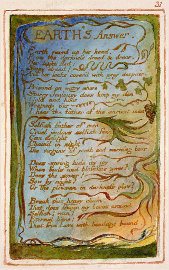Songs of Innocence and Experience Contents
- Social / political context
- Religious / philosophical context
- Literary context
- Textual history
- Songs of Innocence
- Introduction (I)
- The Shepherd
- The Ecchoing Green
- The Lamb
- The little black boy
- The Blossom
- The chimney sweeper (I)
- The little boy lost (I)
- The Little Boy Found
- Laughing song
- A Cradle Song
- The Divine Image
- Holy Thursday (I)
- Night
- Spring
- Nurse's Song (I)
- Infant Joy
- A Dream
- On Another's Sorrow
- Songs of Experience
- Introduction (E)
- Earth's Answer
- The Clod and the Pebble
- Holy Thursday (E)
- The Little Girl Lost
- The Little Girl Found
- The Chimney Sweeper (E)
- Nurse's Song (E)
- The Sick Rose
- The Fly
- The Angel
- The Tyger
- My Pretty Rose-tree
- Ah! Sun-flower
- The Lilly
- The Garden of Love
- The Little Vagabond
- London
- The Human Abstract
- Infant Sorrow
- A Poison Tree
- A Little Boy Lost (E)
- A Little Girl Lost
- To Tirzah
- The Schoolboy
- The Voice of the Ancient Bard
- A Divine Image
Earth's Answer - Synopsis and commentary
Synopsis of Earth's Answer

The earth is personified as a woman in distress. Earth rejects the call of the Bard because she sees God only as a tyrannical figure. This tyrannical rule prevents earth from full expression of her joy and fertility; it prevents the realisation of true love.
Commentary
Our understanding of this poem will depend on how we interpret the question about the nature of the Bard posed by the Introduction to the Songs of Experience. In that poem, the Bard can be seen in two ways:
- The first is as the true prophet, calling fallen humanity back to its true state before the Fall of humankind. In this case, the Earth is deceived in resisting his call. The jealous God, of whom she thinks she is a prisoner and victim, is the creation of the human mind, distorted, according to Blake, as a consequence of the Fall
- The second way of interpreting the Bard is that he serves a tyrannical ‘God', trying to call Earth back under his control. If the Earth is right to see the ‘father of ancient men' as cruel, jealous and selfish, then she is also right to turn away and attempt to remain free.
According to the critic Northrop Frye, in this poem Earth is not imprisoned by the true God of the Gospels; she is imprisoned by the false ‘Selfish father of men' that humans imagine when they picture God ‘beyond them' and not as one with them. Earth rejects the Bard's words because of their blind optimism. She sees that she will remain imprisoned until humanity's creative life, which is shrouded in darkness, is brought to light. When this happens, love will be open and not a secret, jealous possession.
Investigating Earth's Answer
- Look back at the Introduction (E)
- How do you understand the figure of God conveyed there?
- Do you find Earth persuasive in her complaints?
- This isn't a matter of being right or wrong but of being able to form an opinion that you can support with some reasons. You will need to think about this, read and think about the other sections dealing with this poem and then return to it.
